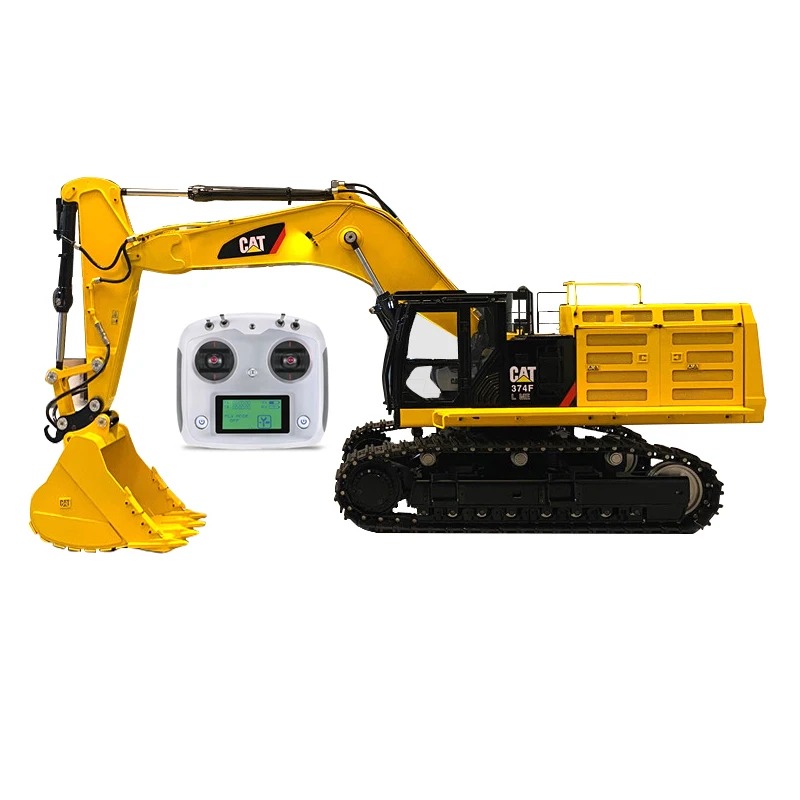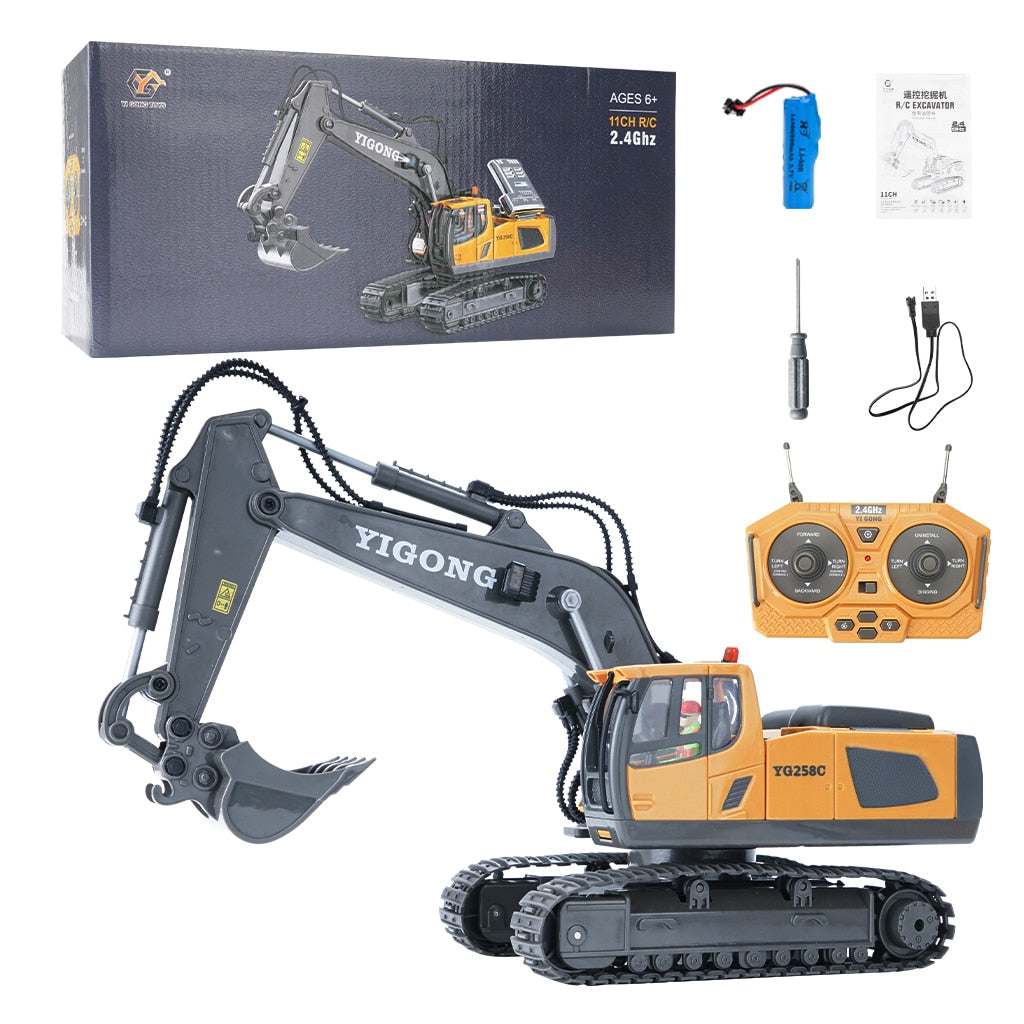Essential Tips for Maximizing Efficiency with a rc excavator
Discover the Value of Excavator in Modern Building Projects
Excavators are crucial devices in modern building jobs. Their versatility permits them to do a vast array of jobs, from digging and grading to demolition and site prep work. Advanced functions, such as hydraulic add-ons and general practitioners, improve their capacities and efficiency on task sites. As the sector develops, the relevance of excavators grows even a lot more. Comprehending their duty can reveal insights right into the future of construction methods. What lies ahead for these equipments?
The Convenience of Excavators in Various Projects
Although excavators are typically connected with large-scale building and construction jobs, their flexibility enables them to be utilized in a variety of applications, from property landscaping to energy maintenance. In urban setups, excavators can browse limited areas to dig foundations for homes or install water drainage systems. Their capacity to execute fragile tasks makes them suitable for landscape design projects, where they can excavate for fish ponds or plant trees. In addition, excavators play a vital role in utility upkeep, successfully excavating trenches for pipelines or wires without interfering with bordering locations. In farming applications, they assist in land clearing up and soil preparation. Furthermore, their adaptability allows them to be geared up with various add-ons, enhancing their functionality throughout various tasks. This complex nature of excavators not only enhances different construction processes but additionally shows their important role in contemporary facilities development and upkeep.
Secret Attributes and Sorts Of Excavators
The discussion on essential features and kinds of excavators highlights the important attributes that make these machines important in building. Various excavator types, each developed for certain jobs, show their flexibility and effectiveness across different applications. rc excavator. Comprehending these attributes and classifications is crucial for optimizing their usage in modern-day building and construction jobs
Excavator Keys In Introduction
Excavators play a pivotal role in modern building, providing versatility and efficiency across various jobs. These heavy equipment units been available in numerous kinds, each customized for details applications. The most typical types include spider excavators, recognized for their security on unequal terrain, and wheeled excavators, which provide greater movement on paved surface areas. Small excavators are preferred for limited rooms and small-scale jobs, while long-reach excavators are made for deep excavating. In addition, there are specialized excavators, such as hydraulic excavators, which improve power and accuracy. Each type features special abilities, making them important for jobs varying from excavating and grading to demolition and material handling. Understanding these variants enables construction experts to select the right excavator for their job needs.
Trick Features Explained
Understanding the crucial features of excavators boosts their reliable application in building and construction projects. Excavators are defined by their effective hydraulic systems, which offer the required pressure for excavating, training, and moving products. Their articulated arms permit a vast array of motion, assisting in precise procedures in restricted rooms. Additionally, the selection of attachments, such as pails, grapples, and augers, expands their adaptability to satisfy different job requirements. The size and weight of excavators likewise add to their security and maneuverability on various terrains. Additionally, developments in innovation have actually led to the assimilation of general practitioner and automation, enhancing accuracy and efficiency in excavation jobs. These features collectively place excavators as essential devices in modern construction.
Applications in Building
Changing construction sites, excavators play an essential role across various applications, ranging from residential structure tasks to large-scale infrastructure developments. These functional devices are outfitted for jobs such as excavating structures, trenching for energies, and website grading. Various sorts of excavators, consisting of crawler, rolled, and mini excavators, offer specific advantages customized to the project requirements. Spider excavators stand out in harsh surfaces, while rolled excavators offer mobility on smooth surface areas. Miniature excavators are ideal for constrained rooms, making them preferred in urban settings. The effectiveness and power of excavators substantially quicken building and construction procedures, ensuring prompt job completion. Their versatility even more boosts their relevance, allowing building and construction groups to deal with a varied variety of obstacles successfully.
Enhancing Performance and Performance on Work Sites
Making best use of efficiency and productivity on job sites is a crucial objective in modern-day construction. Excavators play an essential function in attaining this objective by simplifying different jobs. Their ability to carry out several functions-- such as lifting, grading, and excavating-- decreases the need for extra tools, therefore saving time and resources.Moreover, excavators enhance operations by permitting faster completion of tasks. With sophisticated attributes like hydraulic accessories and general practitioners modern technology, they can implement exact procedures that reduce mistakes and remodel. This precision not just improves the quality of work yet likewise enhances product usage, contributing to cost savings.The versatility of excavators allows them to adapt to various site problems, ensuring that projects progress smoothly no matter difficulties. By incorporating excavators into building processes, groups can significantly enhance their overall efficiency, resulting in prompt task completion and boosted success.
Safety Benefits of Utilizing Excavators
Excavators greatly boost safety on building websites via improved operator presence and decreased hand-operated labor dangers. By providing drivers with a clear view of their surroundings, excavators assist to stop injuries and crashes. In addition, the machinery minimizes the need for workers to participate in hazardous manual tasks, even more advertising a much safer job environment.
Enhanced Driver Presence
Construction sites can be disorderly and filled with potential risks, improved operator exposure plays a vital function in guaranteeing safety when using excavators. Modern excavators are created with big, unobstructed windows and strategically positioned mirrors, permitting operators to maintain a clear view of their surroundings (rc excavator). This boosted presence is important for identifying pedestrians, various other machinery, and numerous challenges, substantially minimizing the threat of crashes. Additionally, lots of excavators integrate advanced modern technology, such as sensors and cams, to offer drivers with extra perspectives, check out this site better boosting understanding. The ability to see even more plainly not only aids in efficient procedure however also fosters a much safer work environment, making it easier for drivers to browse complicated building sites without jeopardizing security standards
Decreased Guidebook Labor Threats
When manual work is minimized with making use of excavators, countless safety and security advantages emerge, significantly improving the wellness of building workers. Excavators reduce the physical strain connected with heavy lifting and recurring tasks, efficiently reducing the risk of bone and joint injuries. By automating processes such as excavating, grading, and relocating products, they permit employees to maintain a safer distance from potential risks. Furthermore, excavators are furnished with advanced security attributes, such as rollover protection systems and enhanced operator comfort designs, which additionally guard employees on site. The outcome is a substantial decrease in office accidents and injuries, causing increased productivity and morale amongst construction teams. Eventually, the adoption of excavators adds to a more secure and a lot more reliable construction setting.
Excavators in Earthmoving and Website Prep Work
In modern-day construction, a substantial part of earthmoving and site prep work jobs counts on the performance and versatility of excavators. These machines are made to manage various soil kinds and terrain, making them indispensable for rating, digging, and trenching tasks. Their hydraulic arms can be outfitted with various accessories, such as augers and containers, permitting drivers to customize their method based on particular job requirements.Excavators succeed at moving big volumes of earth swiftly and efficiently, which increases the total building and construction timeline. They can navigate limited rooms and challenging sites where standard equipment may have a hard time, boosting efficiency. Additionally, the accuracy of excavators assurances that site prep work complies with rigorous specs, minimizing the danger of mistakes that could bring about expensive rework.
The Function of Excavators in Demolition Tasks
Excavators play a vital role in demolition tasks, as they have the power and dexterity needed to take down structures successfully. Geared up with numerous attachments such as hydraulic breakers, shears, and grapples, these equipments can adapt to various demolition requirements, whether for tiny structures or big industrial sites. Their convenience enables drivers to tackle complicated jobs while preserving security and precision.In enhancement to their demolition capabilities, excavators help with particles elimination, ensuring that job websites stay secure and organized. By breaking down frameworks into workable pieces, they enable structured clearing and recycling of products, aligning with modern-day sustainability efforts.Moreover, excavators can access article source tight areas and browse irregular terrain, making them indispensable in city demolition projects. Generally, their durable style and multifunctionality make excavators an essential property in the demolition stage of building and construction, adding considerably to job timelines and performance.


Future Fads in Excavator Innovation and Use
As the building and construction market advances, improvements in excavator modern technology are positioned to change their usage and performance considerably. One significant pattern is the assimilation of automation and expert system, allowing excavators to run with marginal human intervention. This change will certainly enhance precision in tasks such as grading and trenching, reducing human error and increasing productivity.Additionally, the increase of electric and hybrid excavators is shaping an extra lasting building atmosphere, decreasing carbon discharges and gas costs. Boosted telematics systems are likewise emerging, making it possible for real-time tracking of maker performance and upkeep requirements, which can result in far better functional efficiency and longer tools lifespan.Moreover, innovations in attachment technology are increasing the convenience of excavators, enabling them to execute a wider array of tasks. The combination of these patterns shows a future where excavators are smarter, greener, and extra versatile, eventually reshaping building project dynamics.
Frequently Asked Questions
Exactly How Do Excavators Compare to Other Construction Equipment?
Excavators, defined by their versatility and power, master excavating and earthmoving compared to other equipment. Their capacity to carry out numerous jobs, including training and demolition, makes them essential in construction projects, improving general efficiency.

What Is the Typical Lifespan of an Excavator?
The typical life expectancy of an excavator typically ranges from 7,000 to 10,000 operating hours, relying on maintenance, use problems, and design. Proper treatment can extend this life expectancy, making certain peak performance throughout its functional years.
Exactly How Are Excavators Preserved for Ideal Performance?
Excavators call for regular maintenance for peak performance, consisting of regular inspections, fluid checks, filter substitutes, and timely repair work. Carrying out a preventive maintenance routine assists extend their life expectancy and warranties reliable procedure in different building settings.
What Are the Prices Related To Renting Out vs. Purchasing an Excavator?
The prices related to buying an excavator versus renting out vary significantly. Leasing deals reduced upfront expenditures yet can accumulate over time, while acquiring needs a considerable first investment, but offers lasting financial savings and asset ownership advantages.
What Training Is Needed to Operate an Excavator?
Running an excavator calls for specialized training, generally consisting of view security protocols, machine procedure techniques, and environmental understanding. Certification programs typically mandate useful experience, allowing drivers to deal with various tasks successfully while ensuring conformity with sector policies. The most usual types include spider excavators, recognized for their security on uneven surface, and wheeled excavators, which offer higher mobility on smooth surface areas. Mini excavators are favored for small-scale tasks and tight spaces, while long-reach excavators are made for deep digging. In addition, there are customized excavators, such as hydraulic excavators, which enhance power and precision. Various types of excavators, including crawler, rolled, and mini excavators, supply details benefits tailored to the task requirements. Spider excavators succeed in rough terrains, while rolled excavators supply movement on paved surfaces.